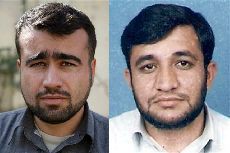By David Zucchino
Reporting from Kabul, Afghanistan -- Journalist Qais Azimy and a colleague spent three nights as unwelcome guests at Kabul's fortress-like National Directorate of Security headquarters this week before they were released.
Their crime? Committing journalism, apparently.

Hamidullah Mohammad Shah and Qais Azimi
Or, as Afghan President Hamid Karzai put it, Azimy, a producer for Al Jazeera, was guilty of reporting "a story in favor of terrorism."
What happened to Azimy and another Al Jazeera producer, Hameedullah Shah, happens often to local reporters who offend top Afghan political and security officials.
The National Directorate of Security told local news media that the two journalists were "a threat to the internal security of the country."
On June 11, Al Jazeera's English-language service broadcast Azimy's report on his visit to the Taliban stronghold of Kunduz in eastern Afghanistan. It showed a Taliban commander boasting that he had hundreds of fighters under his command, along with 12 suicide bombers poised to strike. It also quoted a NATO commander in the region.
At a news conference Wednesday, Karzai was questioned about the detentions by Al Jazeera reporter David Chater, who worked on the story with Azimy. Chater said one of the men had been chained to a chair and deprived of sleep.
Karzai responded that Azimy's story was "not a case of press [freedom] -- it was a case of making a story in favor of terrorism."
"Freedom of the press is respected and allowed and guaranteed by Afghan law," he said. "But promotion of terrorism in the name of the freedom of the press is a violation of the press and freedom of the press."
Azimy, a former Times interpreter, was relieved and relaxed Thursday morning in phone conversations with Times journalists in Kabul. He said he was questioned repeatedly but was not injured.
He could not say more because his editors had ordered him not to speak to reporters.
That put Nick Walshe, the bureau chief for Qatar-based Al Jazeera English, in the uncomfortable position of muzzling a journalist already muzzled by the government.
He said the agency was concerned about Azimy's safety.
"There were certain restrictions that were conditions of the release," Walshe said. "This thing is still alive, I'm afraid."
Walshe said senior editors were consulting with lawyers and trying to arrange meetings with Karzai's office.
"Our guys didn't do anything wrong," he said. "They produced a balanced report."
Al Jazeera's website quoted Chater as saying that the intelligence agency had accused the channel of producing a falsified report with staged material.
"Qais Azimy and myself know the difference between fake footage and real footage," Chater was quoted as saying. He also denied a government charge that the report was unbalanced, pointing out the North Atlantic Treaty Organization official's comments.
Journalists in Afghanistan are ostensibly protected by a media law. But it is riddled with loopholes and allows prosecution of journalists and others for "blasphemy" and for insulting public officials.
A recent report by the Afghan Independent Journalists' Assn. said that 115 cases of violence against journalists were reported and that five journalists had been killed in the last year. Twenty-five journalists were arrested, 24 were assaulted or intimidated by public officials, 22 received death threats and four outlets were forced to close, the group said.
Afghan journalists also face the hazards of reporting from a war zone, which include frequent attacks, death threats or kidnappings by insurgents.
Azimy said he had already been detained by security agents and kidnapped and robbed by the Taliban. He had been asked Sunday to report to intelligence headquarters "for an interview" and was detained, he said.
Shah, a producer for Al Jazeera's Arabic-language service, had been in Kunduz on an earlier assignment.



